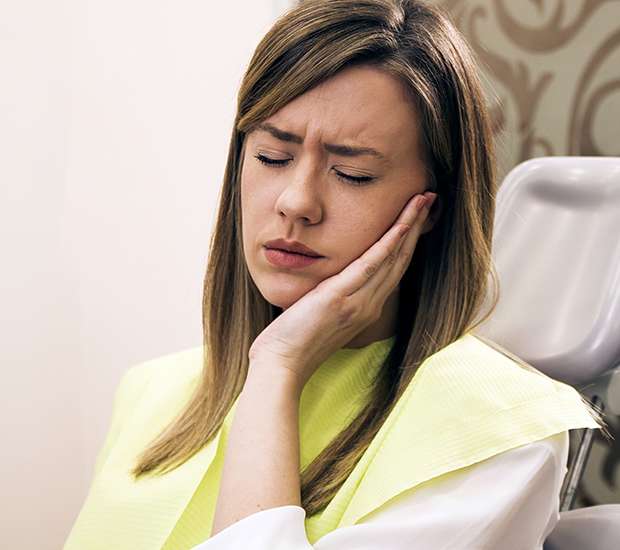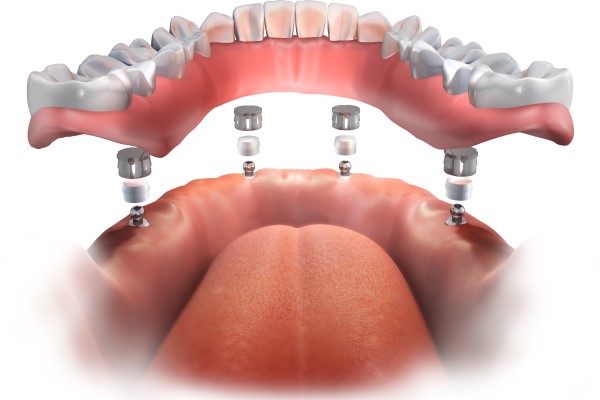TMJ Dentist Des Plaines, IL
Are you looking for a TMJ dentist in Des Plaines? If so, we invite you to schedule a consultation with our dental office by calling (847) 390-5800. We are located in Des Plaines and treat patients throughout the Des Plaines area. During your first appointment, we will conduct a gentle examination and ask questions in order to understand the full extent of your symptoms and how they are impacting you on a daily basis. It is critical that you see a dentist that appreciates the nature of TMJ and the need for caution during dental care. Otherwise, you could further irritate your jaw and muscles, leading to further discomfort.
Understanding TMJ
Temporomandibular joint and muscle disorders (TMJ disorders) are fairly common and can manifest in various ways. There are two temporomandibular joints in your body – one on each side of your head, located in front of your ears. TMJ, as a condition, develops when there is a problem with these joints as they connect the jawbone to the skull, or there are problems with the muscles responsible for chewing. As a TMJ dentist, we find that many people suffer from the condition without knowing that they have it and are, therefore, unable to seek treatment. As a result, we recommend that if you notice any of the symptoms, you call our office at 847-390-5800 to schedule an examination to ascertain whether you do indeed have TMJ.
Symptoms of TMJ
TMJ disorder will often manifest itself in ways that appear to be unconnected to the jaw. This may include severe headaches or ear, neck, and face pain. While many people attribute these symptoms to stress or issues with their spine, they are often a result of this condition and can be easily rectified. Other more obvious symptoms include difficulty chewing or biting down, a popping or clicking sound when opening and closing the jaw, and jaw pain. In some cases, TMJ becomes so bad that a person can't even open their mouth. This is the extreme, and there are almost always signs along the way. By the time people reach this point they have typically been experiencing discomfort in the mornings or throughout the day, difficulty chewing and a lack of mobility with their jaw in general. As a TMJ dentist, we treat patients that have this condition and recommend coming in at the first sign of irritation so that you can begin treatment before it becomes severe.
Causes of TMJ
There are several causes of TMJ with many theories yet to be proven. Some claim that posture can be responsible for TMJ as can poor diet, a lack of sleep, and the cartilage disk found at the joint itself. As a TMJ dentist, we find that one of the most common causes of TMJ is clenching or grinding teeth at night. During times of high-stress, many people fail to have a restful nights sleep and take out their frustration by inadvertently clenching their jaw closed or grinding down their teeth while sleeping. This can manifest very early in life, with children even being impacted by teeth grinding. When this takes place, the muscles and joints are forced to remain in a tense position, leading to pain in the joints and muscles the following morning. If this happens only occasionally, you may have a minor headache and feel better the next day. If, however, this is occurring on a nightly basis, TMJ symptoms can begin to manifest and you will begin to feel less and less comfortable. You may want to pay particular attention to whether or not you have a headache or jaw pain after having a stressful day at work or being upset about something. If there is no correlation and the pain is consistent, you should seek treatment immediately by calling (847) 390-5800. Alternatively, if your discomfort it only now and then, you can bring up your concerns at your next dental examination in our office - as long as it is within the next several months.
Check out what others are saying about our TMJ dental services on Yelp: TMJ Dentist Des Plaines
Treatment Options
As a TMJ dentist, we always recommend starting with the least invasive treatment method. It is important to avoid placing any additional stress on your joints so while it may seem tempting to rush into surgical procedures – wait. Start with gently massaging your jaw muscles a couple of times per day. We can show you how to do so without irritating the area or causing a flair up. You may also want to analyze your diet to determine if any particular foods may be too difficult to chew, thereby making the problem worse. At Healthy Dental Center, we often find that patients are increasing their jaw problems by regularly eating foods like tough meat and nuts that require more forceful chewing, placing stress on the muscles and jaw. By switching to soft foods or ones that are easily pulled apart, you may start to feel better immediately.
In our TMJ dentist office, we provide a non-invasive solution for helping patients to feel better. Since TMJ is often caused by teeth grinding or clenching, preventing the upper and lower teeth from touching is a fast way to experience relief. In our office, we can make an impression of your teeth and use it to create a custom night guard for you to wear while sleeping. The night guard is made of a clear and comfortable plastic that surrounds your upper and lower teeth, similar to how a full retainer would function. The main difference is that the upper and lower portion attach and by doing so, prevent your teeth from touching and your jaw from clenching. Very often, our patients report feeling better immediately and every night that you sleep without grinding your teeth, you have the opportunity to increase the quality of your rest and wake up feeling energized – a win/win scenario. Since the night guard is small, easily removed and stored, there are no clunky devices to worry about and you can take it with you when traveling.
As a TMJ dentist, we speak with patients that have visited medical providers in Illinois that have recommended solving the problem surgically. At Healthy Dental Center, we invite you to schedule an appointment to have your night guard created so that you can exhaust all options before considering escalating your treatment. Surgery is not something to be taken lightly and should only be performed as a last result. To further discuss our non-invasive solution, call 847-390-5800 to speak with one of our team members today.
Questions Answered on This Page
People Also Ask
Q. What should I do if I have a toothache?
Definition of Dental Terminology
- Arthrocentesis
- Arthrocentesis is a procedure that removes synovial fluid from a joint capsule using a syringe.
- Bruxism
- Bruxism is a condition that involves conscious and unconscious teeth grinding, or jaw clenching during the day and night.
- Cosmetic Dentistry
- Cosmetic dentistry is generally used to refer to any dental work that improves the appearance (though not necessarily the function) of a person’s teeth, gums and/or bite.
- Dental Checkup
- A dental checkup is an appointment that involves cleaning the teeth, identifying any signs of infection and removing said signs of infection at least once every six months in the office.
- Dentist
- A dentist, also known as a dental surgeon, is a doctor who specializes in the diagnosis, prevention, and treatment of diseases and conditions of the oral cavity.
- Gingivitis
- Gingivitis is the inflammation of gum tissue that results from plaque, other infections in the mouth and poor oral hygiene.
- Preventive Dentistry
- Preventive dentistry is the dentistry that focuses on maintaining oral health in order to prevent the spread of plaque, the formation of tartar and infections in the mouth.
- Occlusal Appliances
- Occlusal appliances are a type of plastic oral appliance that is not invasive and is removable such as, a night guard, bite guard or splint.
- Temporomandibular Joint
- The temporomandibular joint is the joint between the temporal bone and the lower jaw that helps with opening and closing the jaw.
- TMD
- TMD also stands for Temporomandibular Joint Disorder which is when the temporomandibular bone and jaw bone rub against each other improperly and cause pain.
- TMJ Arthroscopy
- A TMJ arthroscopy is a type of minimally invasive procedure to see the temporomandibular joint with a special camera through a small incision in the cheek.
Back to top of TMJ-Dentist




